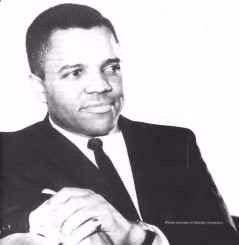

Founder and owner of the Tamla-Motown family record labels, Berry Gordy, Jr., established Motown Records as one of the most important independent labels in the early '60s. Assembling an industrious staff of songwriters, producers, and musicians, Motown Records built one of the most impressive rosters of artist in the history of pop music and became the largest and most successful independent record company in the United State by 1964.
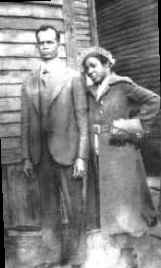
On November 28, 1929 Berry Gordy was born at Detroit's Harper Hospital. Gordy was the seventh child born to Berry and Bertha Gordy. The Gordys an ambitious middle-class family with roots in Georgia farming and retailing.. The family moved to Detroit in the 1922 with their first three children. It was here that they established a successful painting and construction business that allowed the family to purchase a commercial building on the corner of St. Antoine and Farnsworth. Berry Gordy Sr. also opened the Booker T. Washington grocery store and from which he instilled the values of frugality, discipline, family unity and hard work that were so dear to Booker T. Washington. After studying business in college, Bertha co-founded the Friendship Mutual Life Insurance Company.
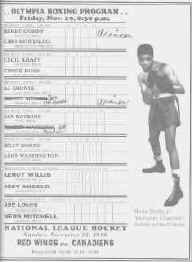
Berry Gordy dropped out of school in the eleventh grade to become a professional boxer. At one time he even fought on the same card with the Brown Bomber Joe Louis at Detroit's Olympia Stadium. He ended a his respectable career as a featherweight in 1950. After serving in the Army in Korea from 1951-1953 his love for jazz caused him to open up the 3-D Record Mart - House of Jazz. To obsessed with his own love of Jazz, Berry was to stubborn to stock the Blues records the neighborhood craved. So in 1955 the store went bankrupt and was forced to close.
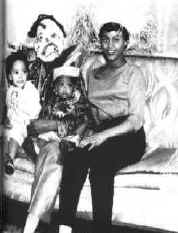
Berry married married Thelma Coleman and quickly had three children. It was after the closing of the record store that Gordy went to work on the assembly line at Ford's Lincoln-Mercury plant. By 1957, he had quit that job to become a professional songwriter.
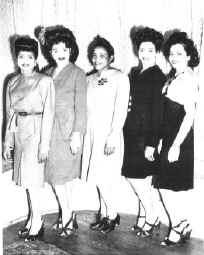
The Flame Show Bar opened in 1949 and was located at the corner of John R and Canfield. The Flame was the showplace for top Black talent in Detroit during the 50s. Billie Holiday, T-Bone Walker, Wynonie Harris were a few of the many great black entertainers that appeared there. The Berry's were in charge of the photo concessions at the Flame. Sisters Gwen and Anna took the photos with brothers George and Robert developing the film. It was during this time the Al Green the club's owner invited Gordy to write songs for the artists he managed which included Jackie Wilson. Berry teaming with Roquel "Billy" Davis began writing at Green's office. Berry would eventually bring sister Gwen in and the trio would write several bestsellers "to Be Loved," "Lonely Teardrops," "That's Why (I Love You So)" and "I'll Be Satisfied" establishing themselves as hit writers. At this time Gordy started doing some of the producing.
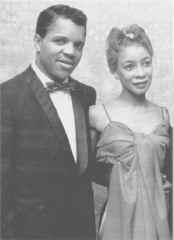
Berry and Raynoma
Gordy
One day Raynoma Liles and her sister Alice auditioned for Gordy. Not only did Gordy meet his next wife Raynoma, but he found a lady who could help him write hit records. Known around the company as Miss Ray, she had perfect pitch and could write lead sheets. They soon formed the Rayber Music Writing Company and for $100 they would do whatever was necessary to help a young singer make a record, be it writing, arranging, rehearsing or recording a demo. In this way they were able to find new talent. They also put together the Rayber Voices, a studio group that backed most of Motown's first acts on their early recordings.
In late 1957, Gordy had his first success with "Reet Petite," which was recorded by Detroit born Jackie Wilson, who had replaced Clyde McPhatter as lead singer of the Dominoes. The next year he wrote "Lonely Teardrops" for Wilson.
An unsuccessful audition of the Matadors for Wilson's manager Nat Tarnopol would change Gordy's life. Berry really like them a lot and told them so after the audition. This was to be the beginning of a close friendship between Gordy and the Matador's lead singer Smokey Robinson. The Matadors soon changed their name to the Miracles. Gordy managed the Miracles and produced their 1958 single "Got a Job" on the End Records label. The small royalty check he received from End along with similar small royalty checks for other hits he had co-written convinced him to form his own label Tamla Records. Originally he had wanted to call it Tammy after the Debbie Reynolds ballad, but the name had already been take.
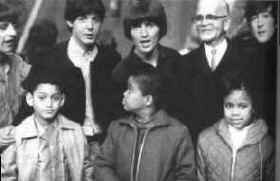
In 1959 Gordy started his own publishing company Jobete Publishing named after his three children: Hazel Joy, Berry and Terry. If you wrote for Motown you were published by Jobete which grew to be one of the most powerful in the industry.
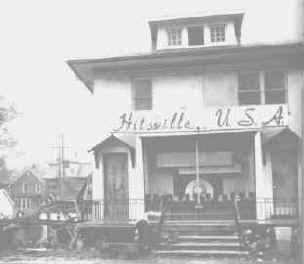
In 1959, the same year that Don Kirshner started Aldon records,
Gordy on January 12 borrowed $800 from his family, rented
an eight room house at 2648 West Grand Boulevard, and started Motown Records,
which would issue records under a variety of labels.
|
|
|
|
Gordy initially recorded R&B artists on Tamla Records. He signed Mabel
John, the gospel trained sister of blues singer Little Willie John. Gordy scored
a minor hit with Tamla's first release, R&B singer Marv Johnson's "Come To
Me." As the record picked up steam Gordy found he could not keep up with the
demands of national production and distribution and leased the master to United
Artists. Later in the first year of operation he co-wrote and produced "Money,"
which was recorded by Barrett
Strong. Not yet equipped to break a national hit "money" was released
by Anna Records which was owned by his sister Gwen and her husband Harvey Fuqua.
"Money" eventually reached the number two spot on the R&B Chart. In November
1959, Gordy recorded "Bad Girl" by a young William "Smokey" Robinson and the
Miracles that reached number ninety-three on the pop charts with the help of
national distribution by Chess Records.
Smokey Robinson convinced Gordy
that Motown should distribute its own records. In 1960, Gordy co-wrote and
distributed "Shop Around" by Smokey Robinson and the Miracles, which was a
number one hit and established Motown as an important independent company. By
this time Gordy had set up the Motown Record Corporation, Hitsville USA and
Berry Gordy Enterprises. Jobette Music was his publishing firm and management
agency International Talent Management, Inc. He also set up various subsidiary
labels.
Through the next four years, Gordy continued to produce hits by
capitalizing on the girl group craze. In 1959, a sixteen year old girl, Mary Wells, approached
Gordy with a song she had written for Jackie Wilson. Unable to write music,
Wells sang the song to Gordy, who immediately signed her and released her
version of "Bye, Bye, Baby," which made the Top Ten on the R&B charts in
1960. Two years later she teamed with Smokey Robinson, who now wrote and
produced for Tamla label and hit with "The One Who Really Loves You," "You Beat
Me To Punch," and "Two Lovers." The next year she recorded "Laughing Boy" and
"Your Old Stand By." In 1964 Wells topped the charts with "My Guy."
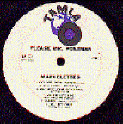
Gordy also charted with the Marvelettes. Around 1961, one of their teachers arranged an audition with Gordy, after which he signed them and released "Please Mister Postman," which became Motown's first number one record. The next year the Marvelettes hit the charts with "Playboy," "Beachwood 4-5679," "Someday Someway," and "Strange I Know." In 1962 The group toured the South as part of the first Motortown Revue.
Encouraged by his success with the Marvelettes, Gordy recorded another
Detroit girl group, Martha and the
Vandellas. Martha Reeves, influenced by Clara Ward and jazz singer Billie
Holiday, joined with Annette Sterling, Rosalind Ashford, and Gloria
Williamson to sing as the Del-Phis while in high school and record the
unsuccessful "I'll Let You Know" for Chess. In 1961 Reeves was hired as a
secretary at Motown and by 1962 had convinced Gordy to record her group. The
group sang backup vocals on a number of Motown hits including "Hitch Hike" and
"Stubborn Kind of Fellow" by Marvin Gaye. Martha
and the Vandellas hit the charts with "Come Get These Memories," followed by the
million selling "Heat Wave" and "Quicksand." The next year they recorded
"Dancing In the Streets" which reached near the top of the charts. Martha
and the Vandellas, along with Mary Wells and the Marvelettes, identified Motown
as a major source of the girl group sound.
Gordy the son of a black
entrepreneur who hoped for the upward mobility of blacks, specifically groomed
and cultivated streetwise teens from the streets of Detroit to make them
acceptable to Mainstream America. In 1964 he hired Maxine Powell, who had
operated a finishing and modeling school, to prep his performers. Powell tried
to transform Motown artists into polished professionals.
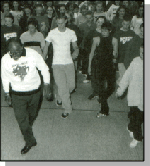
A few months after adding Maxine Powell, Gordy hired choreographer
Cholly Atkins, a well known dancer in the 1930s and 1940s who had performed at
the Cotton Club and Savoy Ballroom, to teach these groups how to move
gracefully
Atkins worked with Maurice King, who served as executive musical director. King who had arranged shows at Detroit's Flame Show Bar for years and had worked with jazz artists such as Billie Holiday and Dinah Washington, taught the Motown groups about stage patter.
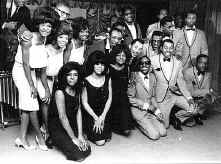
By the mid-1960s, Gordy had assembled a Motown team that could take poor black youths from Detroit and teach them to talk, walk, dress as successful debutantes and debonair gentleman
Gordy combined the polished images of the Motown acts with a gospel-based music that could appeal to mainstream America. Blues and R&B always had a funky look to it back in those days, and Motown wanted to have a look that fathers and mothers would want their children to follow. They wanted to kill the imagery of liquor and drugs and how some people thought it pertained to R&B. Therefore when they reject anything that had a strong blues sound to it when choosing material for their artist.
In place of the blues and R&B, Gordy favored a distinct music grounded by an insistent pounding rhythm section, punctuated by horns and tambourines and featuring shrill, echo-laden vocals that bounced back and forth in a call and response of gospel. Building upon his experience with the girl group sound, he produced a full sound reminiscent and expanding on Phil Specter's Wall of Sound.